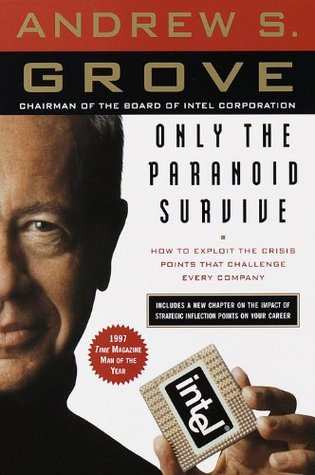More on this book
Community
Kindle Notes & Highlights
In technology, whatever can be done will be done.
You need to plan the way a fire department plans: It cannot anticipate where the next fire will be, so it has to shape an energetic and efficient team that is capable of responding to the unanticipated as well as to any ordinary event.
Tõnu Vahtra liked this
Businesses are about creating change for other businesses.
As I think back, it’s clear to me that struggling with this tough technology and the accompanying manufacturing problems left an indelible imprint on Intel’s psyche.
Others were still clinging to the idea that we could come up with special-purpose memories, an increasingly unlikely possibility as memories became a uniform worldwide commodity.
People who have no emotional stake in a decision can see what needs to be done sooner.
suspect that the people coming in are probably no better managers or leaders than the people they are replacing. They have only one advantage, but it may be crucial: unlike the person who has devoted his entire life to the company and therefore has a history of deep involvement in the sequence of events that led to the present mess, the new managers come unencumbered by such emotional involvement and therefore are capable of applying an impersonal logic to the situation. They can see things much more objectively than their predecessors did.
Most strategic inflection points, instead of coming in with a bang, approach on little cat feet.
Cassandras are usually in middle management; often they work in the sales Organization.
I have learned to respect changes in the tone of messages from people in the field.
when spring comes, snow melts first at the periphery, because that’s where it’s most exposed. Factoring in the news from the periphery is an important contribution to the process of sorting out signal from noise.
Peter Drucker quotes a definition of an entrepreneur as someone who moves resources from areas of lower productivity and yield to areas of higher productivity and yield.
Is it less of a “10X” force because its first instantiation was disappointing? When you think about it, first versions of most things usually are.
you can’t judge the significance of strategic inflection points by the quality of the first version.
If you are in senior management, don’t feel you’re being a wimp for taking the time to solicit the views, convictions and passions of the experts.
But data are about the past, and strategic inflection points are about the future.
It takes many years of consistent conduct to eliminate fear of punishment as an inhibitor of strategic discussion.
break down the walls between those who possess knowledge power and those who possess organization power.
Tõnu Vahtra liked this
With all the rhetoric about how management is about change, the fact is that we managers loathe change, especially when it involves us.
the early stages of a strategic inflection point are fraught with loss—loss of your company’s preeminence in the industry, of its identity, of a sense of control of your company’s destiny, of job security and, perhaps the most wrenching, the loss of being affiliated with a winner.
The replacement of corporate heads is far more motivated by the need to bring in someone who is not invested in the past than to get somebody who is a better manager or a better leader in other ways.
The dilemma is that you can’t suddenly start experimenting when you realize you’re in trouble unless you’ve been experimenting all along. It’s too late to do it once things have changed in your core business.
But mental maps are awfully forgiving of ambiguity. You must force yourself to commit your thoughts to paper.
Management writers use the word “vision” for this. That’s too lofty for my taste. What you’re trying to do is capture the essence of the company and the focus of its business.
it doesn’t take much self-confidence to downsize a company—after all, how can you go wrong by shuttering factories and laying people off if the benefits of such actions are going to show up in tomorrow’s bottom line and will be applauded by the financial community?
Intel is a schoolish company,
Strategic plans are statements of what we intend to do. Strategic actions are steps we have already taken or are taking which suggest our longer-term intent.
the most effective way to transform a company is through a series of incremental changes that are consistent with a clearly articulated end result.
the consequences of being early are less onerous than the consequences of being late.
The early movers are the only companies that have the potential to affect the structure of the industry and to define how the game is played by others.
Mark Twain hit it on the head when he said, “Put all of your eggs in one basket and WATCH THAT BASKET.”
Hedging is expensive and dilutes commitment.
most companies don’t die because they are wrong; most die because they don’t commit themselves.
statements in external forums (which are always given more credibility inside the company than what you say directly to your employees)—is
you can’t change a company without changing its management. I’m not saying they have to pack up their desks and be replaced. I’m saying that they themselves, every one of them, needs to change to be more in tune with the mandates of the new environment.
organization that has a culture that can deal with these two phases—debate (chaos reigns) and a determined march (chaos reined in)—is a powerful, adaptive organization.
anything that can affect industries whose total revenue base is many hundreds of billions of dollars is a big deal.


